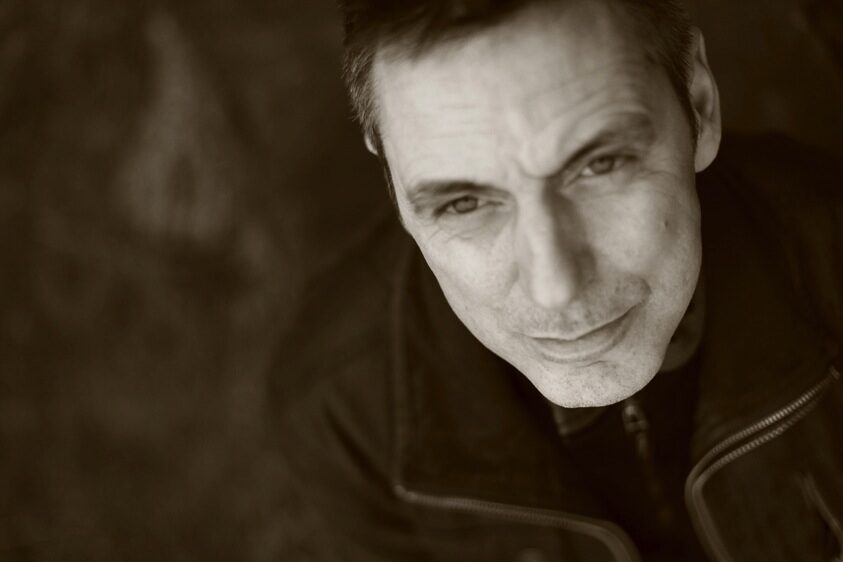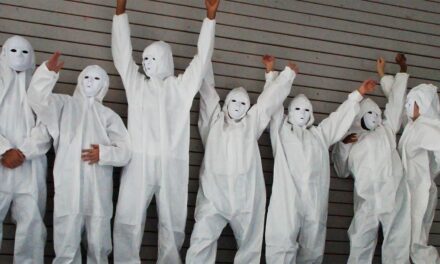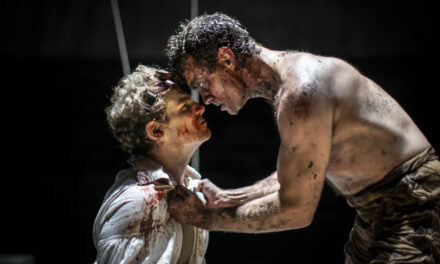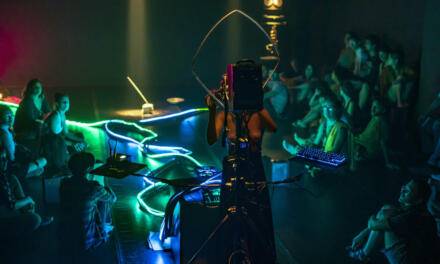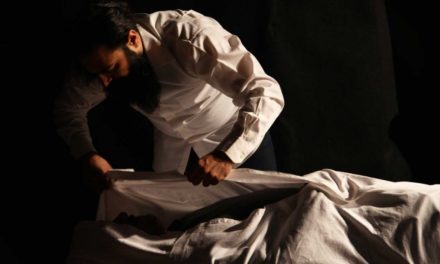Award-winning disabled documentary filmmaker, photographer, artist, published writer, and investigative journalist Richard Butchins has been exploring the word of epidemic theatre through a new serial drama-documentary podcast, “213 Things About Me.” Not only is he introducing new theatrical formats, but promoting how theatre can help in this time of crisis.
“213 Things About Me” is written, narrated and directed by Richard Butchins, and features what Butchins describes as “a combination of my experiences as an autistic adult with a late diagnosis and the writings of the woman who’s been fictionalized.” The woman in question is Rose, played by Rosa Hoskins, and is based on a real friend of Butchins. Diagnosed with Autism at age 36 and unable to find her place in the world, she took her life six months later.
The podcast is structured around a list of facts Rose knew about herself, which she published in a blog online. While Butchins dramatized the list through his script, much of the dialogue is taken directly from that list. “I think she wrote sort of forensically about the experience of trying to navigate the world when you have a different kind of neurological process going on from that of most people,” he said. The first episode discusses Rose’s struggles to relate to others around her, which often led her to self-isolate — something we’re all too familiar with now.
The project has gone through several iterations in different forms, starting as a video installation exhibited at the Edinburgh Festival in 2015, then moving to a one-act, a one-woman play staged at the Battersea Arts Center in 2018. Butchins then pitched the podcast idea to Disability Arts Online, a United Kingdom organization that provides a platform for artists with disabilities, who commissioned the work.
Butchins is a filmmaker and often works in visual arts, so the podcast format was a refreshing new medium to explore. “It gave me an opportunity to do a much longer and more extensive examination of the subject. You’ve got a series of episodes — in this case, seven — so you’ve got a chance to develop a narrative and to explore the subjects in more interesting and different ways,” said Butchins. “Because of the way a podcast is situated online, people can discover it on episode four, and go back and listen to episode one. It stays there so people could hopefully draw an audience over a period of time.”
With theatre being such a crowd dependent art form, the question of what the future of theatre will look like is pervasive. From zoom readings to monologue recordings to online classes, theatre companies are struggling to find ways to present theatre while keeping patrons safe and socially distanced. Butchins’ podcast is one of the creative and accessible alternatives while the theatre world is on hold.
“The theatre is changing format. It’s going to be difficult for people to perform live to an audience of any size,” said Butchins. “So it may be that more theatrical performances move online into audio formats, because they’re relatively affordable, quite quick to make and easy to disseminate. If that audio format gets a strong response, you might then put on a live performance, because you know you’ve got enough interest for people to come and see it.”
To supplement our desire for performances, a podcast like “213 Things About Me” could be just the thing we need. While the visual element that Butchins is so used to is absent, the storytelling aspect is still just as important.
“Your focus is still on the narrative in the same way as it might be with a film or with a TV documentary or a program. But in a way, you kind of drill down more specifically into it,” said Butchins. “I found it refreshing, enjoyable, and obviously technically simpler.”
“213 Things About Me” is not only a theatrical light in a dark pandemic but also a direct commentary on how to handle the pandemic at a personal level. One of Butchins main goals with this podcast is to allow neurotypical people to gain insight into the lives of those on the autism spectrum through semi-shared lockdown experiences. Social distancing is less a health practice and more a way of life for many neurodivergent people.
“I thought it might be useful to try and use this moment in time — where people are experiencing something that a lot of people experience on a regular basis — to try and cross a bridge. I want to try and create a bridge between and engage people with experience, and also possibly give them some tips on how best to manage being socially isolated,” said Butchins.
Butchins’ podcast speaks to the struggles of a neurodivergent person living in a neurotypical world. Often, the best means of self-preservation is self-isolation. Rose’s outlook on her isolation isn’t necessarily as depressing as we take it to be, nor as we should take it in our own lives as it is now being enforced for us. She uses her list to help her accept herself the way she is, social distancing and all.
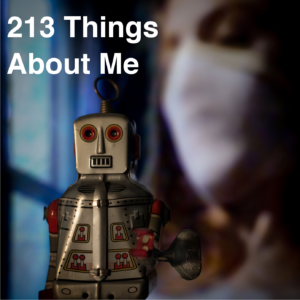
213 Things About Me Podcast Logo from Joe Turnbull (DisabilityArtsOnline).
“It tries to build a bridge between neurotypical and neurodivergent people,” said Butchins. “It’s deliberately written to help people who are neurotypical understand what it might be like to be autistic. I think if you’ve got an interest in understanding how people interact with other people and the world, then this would be interesting to you. And I think everyone’s got an interest in that. Everybody is interacting with other human beings.”
Butchins is quick to point out that this impactful story of course doesn’t speak for everyone on the Autism spectrum — aptly called a spectrum for its range of experiences. But the story told is one that many can relate to, whether one is on the spectrum or not. “I think the way you address an issue in society is by telling strong personal stories,” said Butchins. “What brings people to an issue, whether it be social justice or anything else, is a strong personal story that they can engage with.” Here in one story about one girl, we see hope for the future. A future where neurotypical people and neurodiverse people understand each other. A future where social isolation is a means for people to relate to each other. A future where all this is discovered through a unique form of theatre that proves art can exist and thrive in any time through any challenges.
This post was written by the author in their personal capacity.The opinions expressed in this article are the author’s own and do not reflect the view of The Theatre Times, their staff or collaborators.
This post was written by Dana Pierangeli.
The views expressed here belong to the author and do not necessarily reflect our views and opinions.

